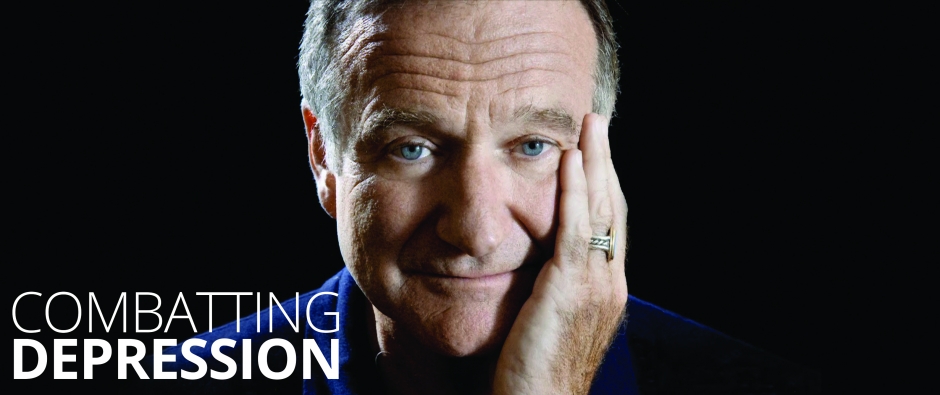On 12 August of this year, the world awoke to the shocking news that actor and comic legend Robin Williams had committed suicide after a long battle with depression. The Best You talked to Paul Farmer, Mind’s Chief Executive, what can be done to help combat this illness.
“The apparent suicide of Robin Williams is a tragic and shocking event,” Paul Farmer said. “Our thoughts are with his friends and family at this very difficult time.”
“Depression is a very real illness. It does not discriminate and can strike anyone regardless of age, gender, ethnic group, profession or social status. We urge anyone who is experiencing the pain and distress of suicidal feelings to seek help as soon as you can. It is ok to ask for help. Try and speak to someone, whether friend, family, their doctor or a charity such as Mind or Samaritans.”
What are the symptoms of depression?
Psychologically: feelings of helplessness, low self-esteem, being irritable or pessimistic, numbness and an inability to enjoy things one would normally take pleasure from.
Physically: change in appetite, trouble sleeping or increased tiredness, and physical aches and pains with no obvious cause, loss of interest in sex.
How common is depression?
Depression with anxiety is the most commonly diagnosed mental health problem. At least one in six people becomes depressed in the course of their lives, and according to the World Health Organisation, by 2020 depression will be the leading cause of health problems in Europe.Some people will just have one patch of depression, but it is very common for people to experience more than one episode in their life. More women than men are diagnosed with depression (11.8% for women to 7.6% in men according to ONS figures), but this may be partly due to the fact that many men don’t seek the help they need.We all have bad days, and the phrase ‘I feel depressed’ is often bandied around, but, if you have felt low for more than a couple of weeks, you should consider visiting your GP.
What does Mind recommend for those dealing with depression?
Talking treatments such as CBT and counselling can give you space to explore difficult feelings with a trained professional. Antidepressants can be very effective and life saving for some people. Speak to your GP about the options available. Our research has also shown that outdoor exercise is often enough to help sufferers turn the corner. Nine out of ten people said that their self-esteem improved after an outdoor walk. Relaxation techniques, such as a massage or acupuncture, might also help. Get enough sleep, and don’t over-indulge in alcohol. Eat well and keep blood sugar and caffeine levels stable. Talk to friends. If feelings of depression persist, visit your GP.
Stigma is one of the main challenges facing people with mental health problems face. How common is stigma?
Mind runs Time to Change, an anti-stigma campaign with another mental health charity, Rethink Mental Illness. Through Time to Change research, we know that almost nine out of 10 people with mental health problems have experienced stigma and discrimination. Since 2007, we have seen an 11 per cent reduction in discrimination reported by people with mental health problems, but we still have a long way to go.
What problems does stigma cause?
Stigma isolates people from friends and family, makes it harder to get or keep a job, and makes people reluctant to seek help, which makes recovery a slower and more difficult process.
What needs to change?
TTC hopes to create a society where mental health problems are not hidden in shame and secrecy. The first step is encouraging everyone to open up about mental health.
Our two information lines (Mind Infoline and Legal Advice Service), along with our network of over 150 local Minds, helps us to reach over 400,000 people a year. Demand for Mind’s services is higher than ever, with 6 million visitors to our website in 2012 (up from 3.6 million in 2011).
How often does depression result in suicide?
The latest ONS figures show that, in England,there were 4,524 suicides in 2012, continuing the slight upward trend that we have seen since 2008. In 2012, 5,981 suicides in people aged 15 and over were registered in the UK – 64 fewer than in 2011. But prior to this, there was an upward trend. The UK suicide rate was 11.6 deaths per 100,000 population in 2012. In 2012, male suicide rates were more than three times higher at 18.2 male deaths compared with 5.2 female deaths per 100,000 population.
The highest suicide rate was among men aged 40 to 44, at 25.9 deaths per 100,000 population.
Is there a link between comedy/creativity and mental health?
There is little evidence to suggest higher prevalence of mental health problems such as depression among specific professions, such as those who work in comedy. We are grateful to anyone brave enough to speak out about their personal experience of mental health problems, whether it’s our President Stephen Fry, comedian Ruby Wax, or anybody else such as our campaigners, supporters and donors. Talking about these issues helps normalise mental health problems, raise awareness and reduce stigma.
If you or someone you know is suffering from depression, call the Mind infoline: 0300 123 3393 or visit their website www.mind.org.uk





